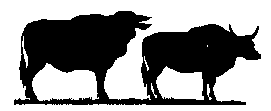Part I : Domesticated Bovine Species
It seems probable that two of our widely used livestock species were domesticated in the Asian tropics: the zebu or humped cattle in India and the water buffalo in the humid marshlands of northeastern India or Southeast Asia. (Both the chicken and some races of pig may also have a tropical Asian origin, but the exact sites of their earliest domestication is unclear.) There are, however, other, much more localized, domesticated bovines in Asia. These are not well studied and deserve greatly increased recognition.
This section highlights:
· Domesticated banteng
· Banteng-cattle hybrids
· Mithan
· Yak
· Yakows.
It is time for the world's scientific community to study the genetics, evolution, and biochemical parameters of the unique animal resources, that are found in Southeast Asia. ALLEN D. TILLMAN Animal Consultant Stillwater, Oklahoma, USA
Though well adapted for survival in their own harsh tropical environments, many domestic livestock breeds are being neglected in the race to achieve temperate zone levels of productivity. CHARLES HICKMAN Department of Dairy Cattle Breeding Ottawa, Canada
Studies should be made of the present and potential role, productivity and efficiency of all domestic animals and birds, large and small, before they are replaced by imported types. Many wild species also could make important contributions to human welfare with proper management. J. K. LOOSLI Department of Animal Science University of Florida .
The conservation of endangered genetic resources represents a genuine and welcome synthesis of the concerns of the agriculturalist and the wildlife enthusiast.
JOHN TINKER British Journalist

MITHAN


















